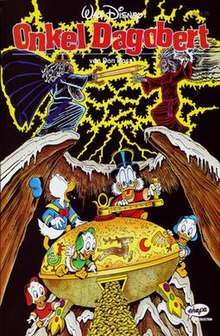The Quest for Kalevala
"The Quest for Kalevala" is a 1999 Uncle Scrooge comic book story written and drawn by Don Rosa. The story was first published in the Danish Anders And & Co. #1999-48; the first American publication was in Uncle Scrooge #334, in October 2004.
| "The Quest for Kalevala" | |
|---|---|
 Cover for the German publication of the story. Art by Don Rosa. | |
| Story code | D 99078 |
| Story | Don Rosa |
| Ink | Don Rosa |
| Hero | Scrooge McDuck |
| Pages | 33 |
| Layout | 4 rows per page |
| Appearances | Scrooge McDuck Donald Duck Huey, Dewey and Louie Gyro Gearloose Little Helper Magica De Spell Väinämöinen Louhi Elias Lönnrot (in a flashback) |
| First publication | Aku Ankka: Sammon salaisuus ja muita Don Rosan parhaita November 10, 1999[1] |
The Quest for Kalevala is based on the Finnish national epic Kalevala, assembled and partly written by Elias Lönnrot in the 19th century. Rosa's inspiration for the story was a Finnish children's book called Koirien Kalevala ("The Canine Kalevala") by the Finnish cartoonist Mauri Kunnas, who was himself inspired by the original Kalevala.
Part of the story takes place in Helsinki, Finland, depicted in an accurate, realistic way as the city looked in the 1950s, though some buildings pictured weren't built until the 1960s.
Plot
While going through his trunk full of old mementos and souvenirs, Scrooge discovers a page that he remembers having originally torn from one of Lönnrot's notebooks when they met in Scotland in the late 19th century. Huey, Dewey, and Louie consult their Junior Woodchucks Guidebook and find out that the notes on the page are part of Lönnrot's notes for the Kalevala and reveal the location of the remains of the Sampo.
Upon hearing of this mythical machine that can produce grain, salt, and most particularly, gold, out of thin air, Scrooge sets out to find it. The Ducks travel to Helsinki, where the director of the Finnish Literature Society explains Lönnrot's notes to them and explains the location marked in them.
The Ducks travel to the island indicated in the notes, where they find Väinämöinen's legendary sword. Touching the sword awakens the spirit of Väinämöinen, which uses the body of whoever touched the sword as its locus of connection to the mortal world. He tells them what happened to the Sampo during the Kalevala times. Väinämöinen's magic brings Gyro Gearloose to the island, and imbued with Seppo Ilmarinen's spirit, Gyro reassembles the Sampo.
However, the Sampo doesn't work because it is missing a part that was stolen by Louhi, now residing in the afterlife in Tuonela, the underworld. Scrooge and Donald go to Tuonela to retrieve the missing part. However, after they have left, Louhi becomes aware of the return of her ancient enemy and summons Magica De Spell to help her get the Sampo back.
Sailing back to continental Finland, Väinämöinen and the Ducks are able to fix the Sampo and start producing gold from thin air. However, Magica De Spell and Louhi attack their ship. In the ensuing battle, Louhi manages to steal Väinämöinen's famous kantele, which holds such great power that she loses interest in the Sampo. As the start of her new reign, Louhi summons the sea monster Iku-Turso and orders it to wreak havoc on Helsinki. Donald goes after Iku-Turso to stop it, it and Louhi being confounded by the modern city. In the process, Donald gets the kantele back and is able to lure Iku-Turso back to the sea.
With Louhi defeated and his kantele returned, Väinämöinen makes the ship levitate. The Ducks are thrown off the ship except Scrooge who clings to Sampo. Väinämöinen invites Scrooge to come to the lands of Kalevala with him as he sees a kindred spirit in Scrooge. Scrooge, however, can't bear to lose his family and friends, so he instead abandons the Sampo. Väinämöinen throws Scrooge off the ship and congratulates him on having made the right choice.
Notes
- All Kalevala characters speak with the poetic verse Lönnrot used in the original Kalevala.
- In the scene where Iku-Turso climbs on top of the Helsinki Cathedral, the Finnish bum's quote "That's the second biggest frog I ever saw" is a reference to the spy parody show Get Smart. It is also often thought to be a reference to an earlier Don Rosa story with Captain Kentucky, in which the hero of the story has to battle a gigantic frog, but Rosa has denied this.[2]
- The notes the old Finnish man plays on his kantele make up the introduction to Finlandia by Jean Sibelius. When Louhi steals Väinämöinen's kantele and flees off to wreak havoc, she plays the opening notes of Ride of the Valkyries by Richard Wagner.
- In Finnish hardcover edition, Rosa included an epilogue, where Tuoni (Death) brings Scrooge's hat back from Tuonela. Scrooge asks Tuoni whether it's possible to take his fortune with him when he dies, but after Tuoni asks a price of 50 Finnish markkas (about 8.40 Euro, 10 USD) for the secret, Scrooge asks Donald to kick him out of his office (which Donald does with sufficient strength to separate Tuoni's skull head from his body). In the version printed in The Don Rosa Library, Tuoni instead asks for a price of 5 USD[3] (about 4.38 Euro, 26.05 Finnish markkas).
- Rosa's famous "D.U.C.K." (Dedicated to Unca Carl from Keno) can be found in the title panel in the hilt of Väinämöinen's sword, on the mane of one of the horses.
- The ermine shown in the first panel, when the Ducks arrive in Korsholm, wears brown fur. This is wrong, because the ermines have white fur in winter.
References
- http://coa.inducks.org/issue.php?c=fi/DR+1999
- http://nafsk.se/pipermail/dcml/1999-December/005905.html
- Rosa, Don (2017). The Don Rosa Library, Vol. 8. Seattle, WA: Fantagraphics Books. p. 198. ISBN 978-1-68396-053-9.